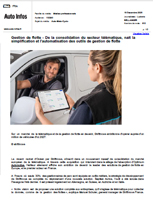
Transport-Logistics, February 2023, p. 38-40
The fuel station weighs heavily in the profitability of road freight transport (TRM). According to the National Road Committee (CNR), the 45% increase in diesel prices was the first cause of the sharp increase in business costs in 2022, estimated at +18.5% for a long-distance heavy truck running on diesel and +43.3% for a truck running on liquefied natural gas (LNG).
In addition to this tense economic context, there is increased environmental pressure from contractors, who require their transport providers to reduce CO₂ emissions. Reducing consumption is becoming a priority, pushing businesses to hunt down any savings.
Analyzing your consumption
The essential step in reducing fuel costs is to precisely identify and analyze fleet consumption. To do this, manufacturers integrate consumption identification functions into their digital services, such as Renault Trucks Optifuel, MAN Perform, Scania Monitoring, DAF Connect, Volvo Dynafleet or Mercedes Fleetboard Cockpit.
In addition, telematics box suppliers report the consumption data that circulates on the truck CAN bus. Companies such as FleetEnergies, Solustop, Geoloc-Conseil or Optimum Automotive install probes directly on tanks in order to measure levels and detect sudden drops synonymous with fuel theft.
Training in eco-driving
Data from vehicle connectivity is accessible on management portals in the form of reports and alerts (engine downtime, etc.). They are then used to train drivers in eco-driving.
Training organizations, specialized service providers and sometimes carriers themselves have refined these solutions in recent years. These tools, increasingly based on artificial intelligence, take into account truck models, uses and loads transported to calculate tangible ecoscores.
For example, CGI Formation has developed its own software for processing telematics data, serving as the basis for training courses adapted to each driver. For its part, FleetEnergies has deployed Rilco AI machine learning technology, integrating and enriching a unique database with the consumption of more than 30,000 vehicles.
Optimize your tours
Before operations, the use of a route optimization solution integrated into the TMS (or independent) makes it possible to reduce the kilometers and the energy consumption of the fleet.
Interfaced with freight exchanges or delivery tracking platforms, these software calculates optimal routes in terms of consumption, taking into account possible additional pick-ups along the way in order to minimize empty returns.
Thanks to the real-time recalculation of routes and the taking into account differences in altitude or the weather, these tools limit overconsumption linked to traffic jams or unfavorable conditions.
Products & services: Monitoring tanks
In 2021, Optimum Automotive took over the company G-Keep and its Securifuel solution, a connected probe without drilling that continuously measures the fuel level in the tank and triggers an audible alarm in the event of siphoning.
Confident in the effectiveness of this tool, Optimum Automotive and its insurance partner WTW offer carriers equipped with Securifuel a reimbursement of stolen fuel, up to 400 euros per contract, provided that the alarm has been triggered. The franchise is 50 liters.
Follow the tire fleet
Monitoring tire condition and pressure is also an important factor in reducing fuel consumption.
According to Michelin, an underinflation of 1.5 bar leads to an average overconsumption of 1% due to an increase in rolling resistance.
A European obligation as of July 2024 imposes the real-time monitoring of pressures using TPMS (Tyre Pressure Monitoring System) sensors. The industry is working to integrate these systems as original equipment on tractors, semi-trailers and carriers as early as next year.
Already, numerous TPMS solutions are available on the market, provided by tire manufacturers or telematics specialists.
More fuel-efficient trucks
Industrial vehicle manufacturers are integrating technologies that promote lower consumption:
- Renault Trucks claims savings of up to 10% on 2023 models dedicated to distribution, thanks to engine optimization, a new injection, an improved gearbox and the Fuel Eco+ package (aerodynamic deflectors, controlled compressor, automatic engine stop).
- DAF announces a 7% reduction in consumption with the new PacCar drivetrain and the 8-speed PowerLine automatic transmission on its 2022 LF model.
- Volvo Trucks highlights an 18% reduction in combined diesel/Adblue consumption during FH I-Save tests, thanks to an improved turbocompound engine, intelligent software and improved aerodynamics. Helena Alsiô, VP Product Management at Volvo Trucks, highlights the effectiveness of the I-Save package.
Share of the various cost items in long-distance TRM (articulated set)
(Precise figures are available from the National Road Committee.)
Renaud Chasle








